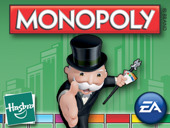By Brad Cook
Monopoly is a lot like life: You can be down to your last five bucks, only to discover that your rich Uncle Pennybags left you a $100 inheritance. And then an unfortunate turn of events could cause you to mortgage your property and go deeper in debt, but don’t worry: another payday is always around the corner. Just don’t get yourself thrown in jail, because then you won’t be able to collect that $200.
Monopoly on the iPod faithfully recreates the classic board game, including those well-loved player tokens and all the traditional rules, such as tossing someone in jail if they roll three doubles in a row. Up to four players can participate, including computer-controlled opponents with three levels of ability. You can even choose between American and British settings — in the latter, Marvin Gardens and Ventnor Avenue are replaced by Piccadilly and Leicester Square, respectively, and so forth.
Play it Your Way
Many of us have played Monopoly with our own house rules over the years, and the iPod version obliges by allowing you to tweak certain settings. For example, you can increase the payday for the Go space up to $400 (with the option to double it if the player lands there), change all players’ starting cash reserves, decide how to conduct auctions when someone passes on purchasing a property (or whether to conduct them at all), and so forth. You can even start a game with all properties randomly distributed to the contestants, allowing you to get right into house and hotel building.
In addition, you can trade properties and cash with other players, another time-honored tradition of those Sunday evenings spent around the dining room table. The computer-controlled participants will also get in on the action, their trading savvy dictated by the difficulty level assigned to them.
Monopoly also tracks your statistics, allowing you to view your overall record, the most money you’ve ever earned in a game, and the most hotels and houses you’ve ever owned at one time. Unfortunately, it can’t tell you how you’ve fared in those metrics since childhood, when you and your siblings argued over who got to be the race car. Perhaps it’s better to leave such things to the pre-digital part of your life. Now you can merely save your progress in the middle of a Monopoly marathon and pick it up again any time. You can even be the race car every time you play.
From Quaker to Corporation: A History of Monopoly
Monopoly’s origins stretch back over a century to 1903, the year a young Quaker woman named Lizzie Magie applied for a patent on The Landlord Game, which she had created as a way to teach others about economist Henry George’s theory of a single tax on land owners, which would fund all government activities and avoid the need for collecting other taxes. The game quickly spread, first through other single tax adherents and college professors and then to those who simply enjoyed playing it and altering the rules to suit their purposes. Many players also changed the property names to match their local areas.
The game’s name also changed, from Landlord’s Game to Auction Monopoly — after the idea of holding an auction when a player passed on buying a property — and then simply Monopoly. Eventually, it found its way into the hands of Charles Darrow, who in 1933 was unemployed because of The Great Depression. He made copies of the set he received, including the misprint of the name Marvin Gardens (it was supposed to be Marven Gardens, a housing area near Atlantic City that took its name from Margate and Ventnor cities), and began selling them.
Darrow obtained a copyright on his version of Monopoly in 1933 and the following year tried to sell it to Parker Brothers, who rejected him. After hearing about the robust sales of Darrow’s handmade Monopoly sets, however, the company changed its mind in 1935, helping him obtain a patent and buying out all other rights-holders’ claims, including Magie’s filing. The game was credited with rescuing Parker Brothers from the brink of bankruptcy.
Millions of copies of Monopoly have been sold worldwide during the intervening decades, although a game called Anti-Monopoly, issued by Ralph Anspach in the mid-1970s, took Parker Brothers’ rights claims to task. When the company sued Anspach, much of the game’s early history, which had been swept under the rug in favor of Darrow being held up as its sole creator, was laid bare. Eventually, however, Parker Brothers was able to defend its legal claim to the name, and Anspach was granted a license to continue selling his game, which he still does today.
iPod Games FAQ
Do you have questions regarding any of the iPod games available from the iTunes Store?

Roll On. Battleship gets ready to sail to a new square.
- Site: Monopoly
- Publisher: Apple Inc.
- Developer: Electronic Arts
- Genre: Cards, Casino & Board
System Requirements
- Mac OS X version 10.3.9 or Windows 2000
- iPod nano (3rd and 4th generation only), iPod classic, or iPod (5th generation only). Not playable on your computer, other iPod models, iPod touch or iPhone. Please check which iPod model you have.
- iTunes 7.5 or higher required to download (games cannot be played in iTunes)

